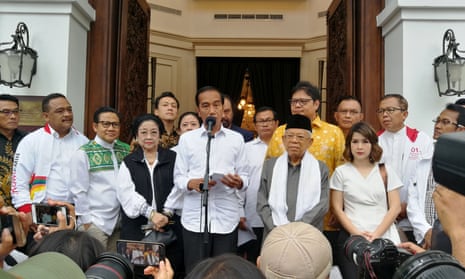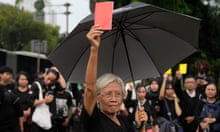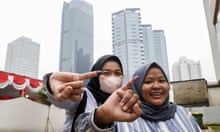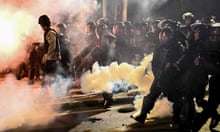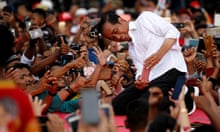The Indonesian president, Joko Widodo, has announced he has won re-election after receiving an estimated 54% of the vote, backtracking on his promise to wait for official results after his challenger made improbable claims of victory.
Widodo, after meeting with parties in his coalition, told reporters the leaders of Malaysia, Singapore, Turkey and other countries had congratulated him on securing a second term.
The vote estimate is based on so-called quick counts of a sample of polling stations by a dozen reputable survey organisations. Widodo said close to 100% of sample polling stations had been counted. The quick counts have been accurate in previous elections.
“We all know that the QC [quick count] calculation is a scientific calculation method. From the country’s experiences of past elections the accuracy is 99.9%, almost the same as real count results,” Widodo said.
Widodo’s rival, former general Prabowo Subianto, had claimed he won 62% of the vote in Wednesday’s election based on his campaign’s own counts, repeating a similar claim when he lost to Widodo in 2014.
The Election Commission is required to release official results by 22 May.
Indonesia, the world’s most populous Muslim-majority nation, is an outpost of democracy in a South-east Asian neighbourhood of authoritarian governments and is forecast to be among the world’s biggest economies by 2030. A second term for Widodo, the first Indonesian president from outside the Jakarta elite, could further cement the country’s two decades of democratisation.
Subianto, a strident nationalist, ran a fear-based campaign, highlighting what he sees as Indonesia’s weakness and the risk of disintegration or exploitation by foreign powers.
Widodo said he had sent a representative to talk to Subianto and his camp.
“This afternoon I have sent an envoy to meet Prabowo to set a meeting, and if people see our meeting, we will be able to show how the elections have ended smoothly, safely and peacefully,” he said.
The country’s security minister and its military and police chiefs said earlier on Thursday they would crack down on any attempts to disrupt public order while official results from presidential and legislative elections are tabulated.
The security minister, Wiranto, who uses a single name, told a news conference with the chiefs of police and military that security forces would “act decisively” against any threats to order.
He said the voter turnout of 80.5% conferred upon the winner of the presidential election “high legitimacy”.
The national police chief, Tito Karnavian, said the Election Commission and courts were the appropriate institutions for resolving complaints about the election.
Subianto’s hardline Muslim supporters were planning to hold mass prayers in central Jakarta on Friday but it was unclear if the event would be allowed to go ahead.
“I appeal to everybody not to mobilise, both mobilisation to celebrate victory or mobilisation about dissatisfaction,” Karnavian said.
The election was a huge logistical exercise with 193 million people eligible to vote, more than 800,000 polling stations and 17 million people involved in ensuring the polls ran smoothly. Helicopters, boats and horses were used to get ballots to remote and inaccessible corners of the archipelago.
Voting ran smoothly, apart from a few districts where logistical problems caused delays, and was peaceful, a remarkable achievement for a country steeped in political violence.
Widodo’s campaign highlighted his progress in poverty reduction and improving Indonesia’s inadequate infrastructure with new ports, toll roads, airports and mass rapid transit. The latter became a reality last month in chronically congested Jakarta with the opening of a subway.
